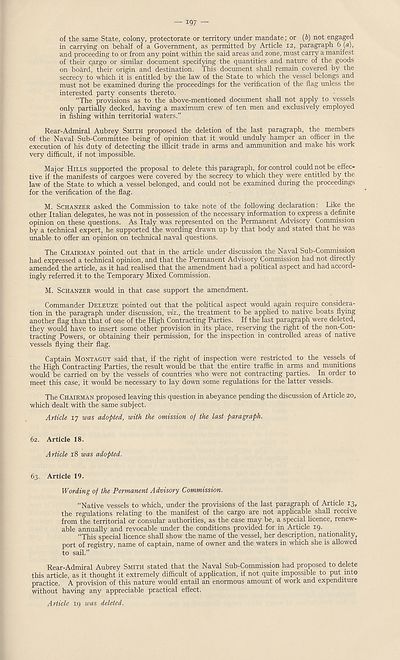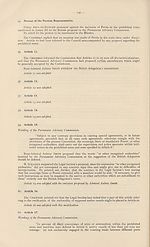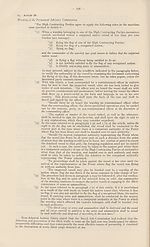Armament > Conference for the control of the international trade in arms, munitions and implements of war
(199)
Download files
Complete book:
Individual page:
Thumbnail gallery: Grid view | List view

19/ —
of the same State, colony, protectorate or territory under mandate; or (b) not engaged
in carrying on behalf of a Government, as permitted by Article 12, paragraph 6 (a),
and proceeding to or from any point within the said areas and zone, must carry a manifest
of their cargo or similar document specifying the quantities and nature of the goods
on board, their origin and destination. This document shall remain covered by the
secrecy to which it is entitled by the law of the State to which the vessel belongs and
must not be examined during the proceedings for the verification of the flag unless the
interested party consents thereto.
“The provisions as to the above-mentioned document shall not apply to vessels
only partially decked, having a maximum crew of ten men and exclusively employed
in fishing within territorial waters.”
Rear-Admiral Aubrey Smith proposed the deletion of the last paragraph, the members
of the Naval Sub-Committee being of opinion that it would unduly hamper an officer in the
execution of his duty of detecting the illicit trade in arms and ammunition and make his work
very difficult, if not impossible.
Major Hills supported the proposal to delete this paragraph, for control could not be effec¬
tive if the manifests of cargoes were covered by the secrecy to which they were entitled by the
law of the State to which a vessel belonged, and could not be examined during the proceedings
for the verification of the flag.
M. Schanzer asked the Commission to take note of the following declaration: Like the
other Italian delegates, he was not in possession of the necessary information to express a definite
opinion on these questions. As Italy was represented on the Permanent Advisory Commission
by a technical expert, he supported the wording drawn up by that body and stated that he was
unable to offer an opinion on technical naval questions.
The Chairman pointed out that in the article under discussion the Naval Sub-Commission
had expressed a technical opinion, and that the Permanent Advisory Commission had not directly
amended the article, as it had realised that the amendment had a political aspect and had accord¬
ingly referred it to the Temporary Mixed Commission.
M. Schanzer would in that case support the amendment.
Commander Deleuze pointed out that the political aspect would again require considera¬
tion in the paragraph under discussion, viz., the treatment to be applied to native boats flying
another flag than that of one of the High Contracting Parties. If the last paragraph were deleted,
they would have to insert some other provision in its place, reserving the right of the non-Con-
tracting Powers, or obtaining their permission, for the inspection in controlled areas of native
vessels flying their flag.
Captain Montagut said that, if the right of inspection were restricted to the vessels of
the High Contracting Parties, the result would be that the entire traffic in arms and munitions
would be carried on by the vessels of countries who were not contracting parties. In order to
meet this case, it would be necessary to lay down some regulations for the latter vessels.
The Chairman proposed leaving this question in abeyance pending the discussion of Article 20,
which dealt with the same subject.
Article 17 was adopted, with the omission of the last paragraph.
62. Article 18.
Article 18 was adopted.
63. Article 19.
Wording of the Permanent Advisory Commission.
“Native vessels to which, under the provisions of the last paragraph of Article 13,
the regulations relating to the manifest of the cargo are not applicable shall receive
from the territorial or consular authorities, as the case may be, a special licence, renew¬
able annually and revocable under the conditions provided for in Article 19.
“This special licence shall show the name of the vessel, her description, nationality,
port of registry, name of captain, name of owner and the waters in which she is allowed
to sail.”
Rear-Admiral Aubrey Smith stated that the Naval Sub-Commission had proposed to delete
this article, as it thought it extremely difficult of application, if not quite impossible to put into
practice. A provision of this nature would entail an enormous amount of work and expenditure
without having any appreciable practical effect,
Article 19 was deleted.
of the same State, colony, protectorate or territory under mandate; or (b) not engaged
in carrying on behalf of a Government, as permitted by Article 12, paragraph 6 (a),
and proceeding to or from any point within the said areas and zone, must carry a manifest
of their cargo or similar document specifying the quantities and nature of the goods
on board, their origin and destination. This document shall remain covered by the
secrecy to which it is entitled by the law of the State to which the vessel belongs and
must not be examined during the proceedings for the verification of the flag unless the
interested party consents thereto.
“The provisions as to the above-mentioned document shall not apply to vessels
only partially decked, having a maximum crew of ten men and exclusively employed
in fishing within territorial waters.”
Rear-Admiral Aubrey Smith proposed the deletion of the last paragraph, the members
of the Naval Sub-Committee being of opinion that it would unduly hamper an officer in the
execution of his duty of detecting the illicit trade in arms and ammunition and make his work
very difficult, if not impossible.
Major Hills supported the proposal to delete this paragraph, for control could not be effec¬
tive if the manifests of cargoes were covered by the secrecy to which they were entitled by the
law of the State to which a vessel belonged, and could not be examined during the proceedings
for the verification of the flag.
M. Schanzer asked the Commission to take note of the following declaration: Like the
other Italian delegates, he was not in possession of the necessary information to express a definite
opinion on these questions. As Italy was represented on the Permanent Advisory Commission
by a technical expert, he supported the wording drawn up by that body and stated that he was
unable to offer an opinion on technical naval questions.
The Chairman pointed out that in the article under discussion the Naval Sub-Commission
had expressed a technical opinion, and that the Permanent Advisory Commission had not directly
amended the article, as it had realised that the amendment had a political aspect and had accord¬
ingly referred it to the Temporary Mixed Commission.
M. Schanzer would in that case support the amendment.
Commander Deleuze pointed out that the political aspect would again require considera¬
tion in the paragraph under discussion, viz., the treatment to be applied to native boats flying
another flag than that of one of the High Contracting Parties. If the last paragraph were deleted,
they would have to insert some other provision in its place, reserving the right of the non-Con-
tracting Powers, or obtaining their permission, for the inspection in controlled areas of native
vessels flying their flag.
Captain Montagut said that, if the right of inspection were restricted to the vessels of
the High Contracting Parties, the result would be that the entire traffic in arms and munitions
would be carried on by the vessels of countries who were not contracting parties. In order to
meet this case, it would be necessary to lay down some regulations for the latter vessels.
The Chairman proposed leaving this question in abeyance pending the discussion of Article 20,
which dealt with the same subject.
Article 17 was adopted, with the omission of the last paragraph.
62. Article 18.
Article 18 was adopted.
63. Article 19.
Wording of the Permanent Advisory Commission.
“Native vessels to which, under the provisions of the last paragraph of Article 13,
the regulations relating to the manifest of the cargo are not applicable shall receive
from the territorial or consular authorities, as the case may be, a special licence, renew¬
able annually and revocable under the conditions provided for in Article 19.
“This special licence shall show the name of the vessel, her description, nationality,
port of registry, name of captain, name of owner and the waters in which she is allowed
to sail.”
Rear-Admiral Aubrey Smith stated that the Naval Sub-Commission had proposed to delete
this article, as it thought it extremely difficult of application, if not quite impossible to put into
practice. A provision of this nature would entail an enormous amount of work and expenditure
without having any appreciable practical effect,
Article 19 was deleted.
Set display mode to:
![]() Universal Viewer |
Universal Viewer | ![]() Mirador |
Large image | Transcription
Mirador |
Large image | Transcription
Images and transcriptions on this page, including medium image downloads, may be used under the Creative Commons Attribution 4.0 International Licence unless otherwise stated. ![]()
| League of Nations > Armament > Conference for the control of the international trade in arms, munitions and implements of war > (199) |
|---|
| Permanent URL | https://digital.nls.uk/195384350 |
|---|
| Shelfmark | LN.IX |
|---|
| Description | Over 1,200 documents from the non-political organs of the League of Nations that dealt with health, disarmament, economic and financial matters for the duration of the League (1919-1945). Also online are statistical bulletins, essential facts, and an overview of the League by the first Secretary General, Sir Eric Drummond. These items are part of the Official Publications collection at the National Library of Scotland. |
|---|---|
| Additional NLS resources: |
|

